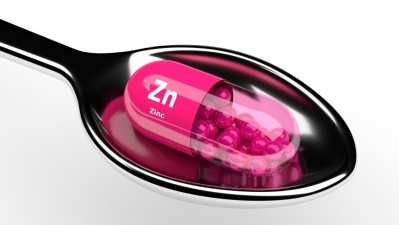Zinc complex may fight diabetes through effects on kidney and liver: Japanese study

Insulin resistance and obesity are the most common symptoms of non-alcoholic fatty liver disease, and insulin-resistant individuals with either excessive or insufficient subcutaneous fat typically also have excessive fat accumulation in the liver.
Zinc-based compounds are said to have positive effects against metabolic syndrome-induced diseases like diabetes and hypertension, and researchers from the Kyoto Pharmaceutical University, Kobe Women's University and Mukogawa Women's University attempted to explore how Zn(hkt)2might ameliorate lipid metabolism in the liver and kidney.
They fed four-week-old male mice a high-fat diet including either 20mg of pioglitazone/kg of body weight (control group) or 10mg to 20mg of zinc/kg of body weight.
They then collected the mice's blood, kidney and liver samples, and evaluated their organs for fat accumulation.
Zinc's multiple benefits
After four months on a high-fat diet, the mice had ectopic fat deposition in the kidney and liver, but those that had been treated with Zn(hkt)2 had increased zinc accumulation in both organs.
This lowered lipid accumulations, toxicity, and triglyceride and total cholesterol levels.
The mice that had not been treated, however, were reported to have developed hypertriglyceridaemia and hypercholesterolaemia, in addition to fatty liver disease.
The researchers stated that the gathered data implied that Zn(hkt)2 "activated lipid metabolism such as beta-oxidation by activating or inhibiting some enzymes".
In addition to lowering lipids and toxicity, Zn(hkt)2 also displayed anti-inflammatory properties throughout the body.
Kidney complications
The researchers also said metabolic syndrome or diabetes from a high-fat diet could induce kidney alterations, which would result in an organ weight increase and inflammatory infiltrates, and added that the "increased release of pro-inflammatory cytokines may be associated with kidney damage and oxidative stress".
These results led the researchers to state that "pioglitazone and Zn(hkt)2 treatments both reduced the liver and kidney lipid accumulation, which ameliorated (the) lipid toxicity".
They concluded that "Zn(hkt)2 has the potential to protect hepatic and renal function from the lipid toxicity, and its effects are likely higher than those of pioglitazone", and that Zn(hkt)2 could have potential as a "novel anti-dyslipidaemia compound for treating diet-induced obesity".
Source: In Vivo
https://doi.org/10.21873/invivo.11181
"Beneficial Effect of Bis(Hinokitiolato)Zn Complex on High-fat Diet-induced Lipid Accumulation in Mouse Liver and Kidney"
Authors: Yuki Naito, et al.















